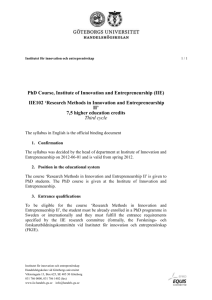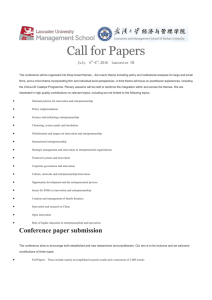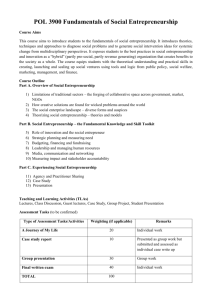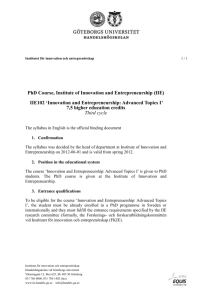Study Guide 2014 GM1306 'Methods for Practical Entrepreneurship
advertisement
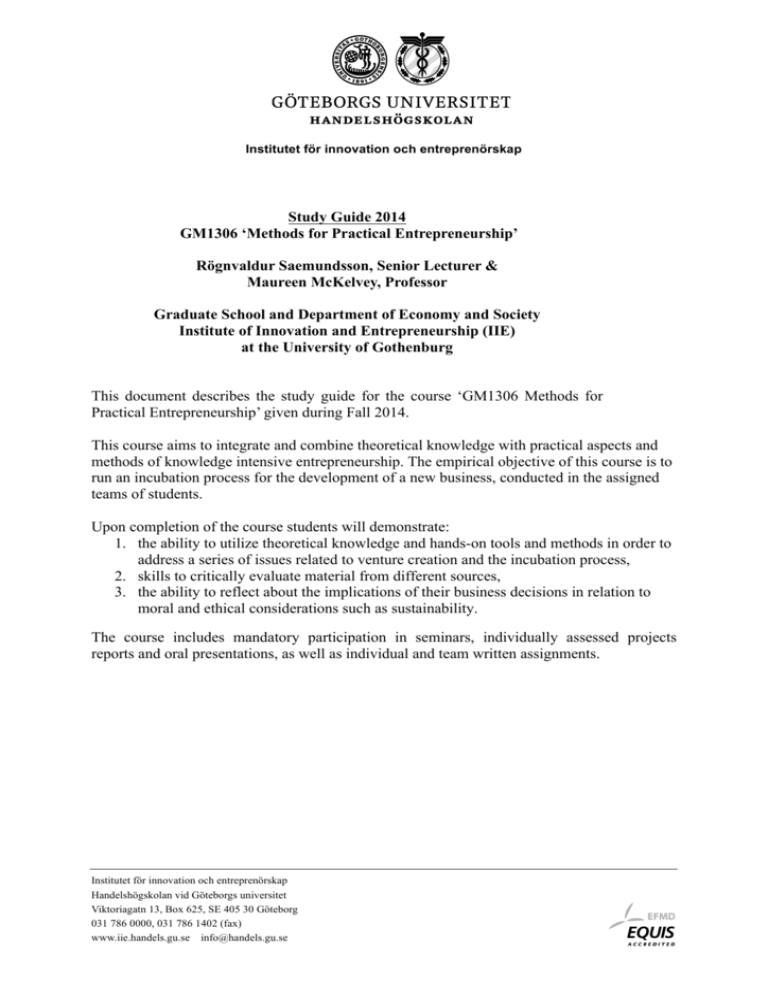
Institutet för innovation och entreprenörskap Study Guide 2014 GM1306 ‘Methods for Practical Entrepreneurship’ Rögnvaldur Saemundsson, Senior Lecturer & Maureen McKelvey, Professor Graduate School and Department of Economy and Society Institute of Innovation and Entrepreneurship (IIE) at the University of Gothenburg This document describes the study guide for the course ‘GM1306 Methods for Practical Entrepreneurship’ given during Fall 2014. This course aims to integrate and combine theoretical knowledge with practical aspects and methods of knowledge intensive entrepreneurship. The empirical objective of this course is to run an incubation process for the development of a new business, conducted in the assigned teams of students. Upon completion of the course students will demonstrate: 1. the ability to utilize theoretical knowledge and hands-on tools and methods in order to address a series of issues related to venture creation and the incubation process, 2. skills to critically evaluate material from different sources, 3. the ability to reflect about the implications of their business decisions in relation to moral and ethical considerations such as sustainability. The course includes mandatory participation in seminars, individually assessed projects reports and oral presentations, as well as individual and team written assignments. Institutet för innovation och entreprenörskap Handelshögskolan vid Göteborgs universitet Viktoriagatn 13, Box 625, SE 405 30 Göteborg 031 786 0000, 031 786 1402 (fax) www.iie.handels.gu.se info@handels.gu.se 14.08.31 2 / 8 Schedule during Fall 2014: The course is composed of four modules: • M1: Setting the scene • M2: Customer Discovery • M3: Customer Validation • M4: Scaling up and growth The content of the modules are delivered in lectures and applied in a project that students work on throughout the course. Students will report progress of project work every other week. Coaching is provided for project work that is a part of the course as well as for extra curricular activities related to the projects, e.g. establishing of a company. Coaching is scheduled every other week (45 min pr. group) in relation to the progress meetings to prepare next two weeks. Additional coaching is organized by the students and coaches as needed. Early in the course an advisory group will be established for each project. The advisory group includes external idea owners if applicable, or other external actors. The role of the advisory group is to provide feedback to the project groups. The group shall meet the advisory group at least three times during the course: • To present business hypotheses (shortly after Sept 22) • When suggesting to proceed from discovery to validation • Final presentation Under the supervision of the coaches, students shall book, organize and lead the meetings for each group (except final presentation). The GUL page will be updated with any changes to the following schedule. Date Room Description Teachers/ Coaches Preparation Mon Sep 1 9-16 M1: Introduction and overview of the course. M1: Why Entrepreneurship? M1: Entrepreneurial opportunities and opportunity development M1: The Customer Development Process M1: Business Models Workshop M1: Video Reflection Assignment 1 presented RJS B&D: 1-68 O&P: 14-51 O&P: 198-239 Literature pack 1 Tue Sep 2 9-12 M2: Customer Discovery I&II Preparation for project work M2: Written assignment on hypotheses and priorities presented RJS B&D: 69-226 (browse) Mon Sep 8 11-12 Project kick-off Project methods Advisory group MM AN HT Hand in video reflection 1 Mon Sep 22 Project briefing (15 min pr group) Coaching (45 min pr group) AN HT Create log and visuals 14.08.31 3 / 8 8-13 Hand in written assignment Mon Sep 29 9-16 M1: Discussion: Video reflection 1 M2: Entrepreneurial learning M2: Prototype Development M2: Customer Discovery III&IV M2: Video reflection assignment 2 presented RJS View video reflections B&D: 227-273 (browse) Literature pack 2 Mon Oct 6 8-13 Project briefing (15 min pr group) Coaching (45 min pr group) AN HT Update log and visuals Tue Oct 21 8-13 Project briefing (15 min pr group) Coaching (45 min pr group) AN HT Update log and visuals Hand in video reflection 2 Update log and visuals View video reflections B&D: 277-289 B&D: 291-464 (browse) Literature pack 3 Mon Nov 3 8-16 Project briefing (15 min pr group, AN, HT, RJS) M2: Discussion: Video reflection 2 M3: Customer Validation M3: Sales Workshop M3: Progress Indicators M3: Video reflection assignment 3 presented Tue Nov 4 9-13 Coaching (45 min pr group) AN HT Mon Nov 17 8-13 Project briefing (15 min pr group) Coaching (45 min pr group) AN HT Update log and visuals Mon Dec 1 8-16 Project briefing (15 min pr group, AN, HT, RJS) M4: Organizing the venture M4: Staffing the venture M4: Financing the venture M4: Managing growth RJS Update log and visuals Literature pack 4 Tue Dec 2 9-13 Coaching (45 min pr group) AN HT Mon Dec 15 8-13 Project briefing (15 min pr group) Coaching (45 min pr group) AN HT Update log and visuals Mon Jan 12 9-12 Final presentations Home exam presented. MM AN HT RJS Hand in presentation RJS 14.08.31 4 / 8 Wed Jan 14 Hand in home exam AN: Anders Nilsson, HT: Håkan Thorbjörnsson, MM: Maureen McKelvey, RJS: Rögnvaldur J. Saemundsson Contact information Rögnvaldur J. Saemundsson Institute for Innovation and Entrepreneurship (IIE) Department of Economy and Society rognvaldur.saemundsson@handels.gu.se Teacher responsible for course Maureen McKelvey Professor of Innovation and Industrial Management Institute for Innovation and Entrepreneurship (IIE) Department of Economy and Society maureen.mckelvey@handels.gu.se www.handels.gu.se/iie Coaches Anders Nilsson Institute for Innovation and Entrepreneurship (IIE) Department of Economy and Society anders.nilson@handels.gu.se Håkan Thorbjörnsson GU Holding AB Erik Dahlbergsgatan 11A hakan.thorbjornsson@holding.gu.se GS Administrator Maria Calpén Administrative Coordinator Graduate School maria.calpen@gs.gu.se Overall assessment Overall grade for the course (F, G, VG) will be based on: • Three reflective video recordings (individual, 5%) • Two discussion sessions (individual, 5%) • Two workshop sessions (individual, 5%) • Written assignment on business model hypotheses (group, 5%) • Seven project bi-weekly reports (individual, 30%) • Final presentation (group, 30%) • Home exam (individual, 20%) 14.08.31 5 / 8 Assessment of individual assignments Reflective Video Recordings Each students will hand in three video recordings, 3-5 minutes each with their reflections on the following topics: • Entrepreneurship as a career path (reflection 1) • Entrepreneurial learning in the business development process (reflection 2) • The art of closing sales (reflection 3) The recordings will be graded (F, G, VG) based on: • Connection made to the literature (40%) • Connection made to a context (personal, group, project, etc.) (30%) • Disposition and clarity (30%) Written Assignment on Business Model Hypotheses Each group will hand in a written report including a prioritized list the business model hypotheses they intend to test for their project. The assignment will be graded (F, G, VG) based on: • Completeness (40%) • Rationale for prioritization (40%) • Disposition and clarity (20%) Discussions The class will participate in three discussion sessions, one for each video reflection. Participation in discussions will be graded (F, G, VG) based on: • Speaking (40%) • Contribution to discussion (60%) Workshops Students will participate in two workshops, one on how to apply the business model canvas, and one on the sales process. Participation in workshops will be graded (F, G, VG) based on: • Contribution to group work (40%) • Contribution to discussion (60%) Home Exam At the end of the course each student will, individually, take a 48 hour home exam. The exam will consist of three questions, two of which are related to the topic of "Scaling up and growth". Answers to questions on the home exam will be graded (F, G, VG) based on: • Insights and understanding (20%) • Connections made to the literature (20%) • Connections made to a context (personal, group, project, etc.) (20%) 14.08.31 6 / 8 • • Critical evaluation of material from different sources (20%) Disposition and clarity (20%) Final Presentation The project teams will report the results from the business development process during a 20 minutes oral presentation. The presentation slides, with additional information (max 4 pages), are handed in. The final presentation will be graded (F, G, VG) based on: • Rationale for final decision (30%) • Plausibility of next steps (30%) • Disposition and clarity (40%) Project bi-weekly briefings The project teams will brief students and coaches of their progress every two weeks (see schedule). Based on logbook entries and information from the briefings project work will graded every other week (F, G, VG) based on: • Effectiveness in following the business development process (30%) • Effectiveness of project management (30%) • Individual contribution to effective group work (40%) Reading list Text books: Blank, S. and Dorf, B. (2012) The Startup Owner's Manual. Pescadero: K&S Ranch. Osterwalder, A. and Pigneur, Y. (2010) Business Model Generation. Hoboken: John Wiley & Sons. Literature Pack 1 McMullen, J.S. and Shepherd, D.A. (2006) Entrepreneurial action and the role of uncertainty in the theory of the entrepreneur. Academy of Management Review 31(1): 132-152. Poschke, M. (2013) Who becomes and entrepreneur? Labor market prospects and occupational choice. Journal of Economic Dynamics & Control 37: 693-710 (ONLY sections 1 & 2) Sarasvathy, S.D. (2001) Causation and effectuation: toward a theoretical shift from economic inevitability to entrepreneurial contingency. Academy of Management Review 26 (2): 243– 263. Shane, S. and Venkataraman, S. (2000) The promise of entrepreneurship as a field of research, Academy of Management Review 26: 13–17. 14.08.31 7 / 8 Literature Pack 2 Busenitz, L., & Barney, J. (1997) Differences between entrepreneurs and managers in large organizations: Biases and heuristics in strategic decision-making. Journal of Business Venturing 12(1): 9–30. Dimov, D. (2010) Nascent entrepreneurs and venture emergence: Opportunity confidence, human capital and early planning. Journal of Management Studies 46(3): 1123-1153. Politis, D. (2005) The process of entrepreneurial learning: a conceptual framework. Entrepreneurship Theory and Practice 29: 399–424. Sanz-Velasco, S. and Saemundsson, R. (2007) Entrepreneurial learning in academic spin-offs: A business model perspective. International Journal of Entrepreneurship and Innovation Management 8(1): 15-35. Literature Pack 3 Moncrief, W.C. and Marshall, G.W. (2005) The evolution of the seven steps of selling. Industrial Marketing Management 34: 13-22. Verbeke, W., Dietz, B., and Verwall, E. (2011) Drivers of sales performance: a contemporary meta-analysis. Have salespeople become knowledge brokers? Journal of the Academy of Marketing Science 39: 407-428. Literature Pack 4 Beckman, C.M., Burton, M.D., and O'Reilly, C. (2007) Early teams: The impact of team demography on VC financing and going public. Journal of Business Venturing 22: 147-­‐ 173. Brinckmann, J., Salomo, S., and Gemuenden, H.G. (2011) Financial management competence of founding teams and growth of new technology-­‐based firms. Entrepreneurship Theory & Practice 35: 217-­‐243. Garnsey, E. (1998) A Theory of the Early Growth of the Firm. Industrial and Corporate Change 7: 523-­‐556. Oviatt, B.M. and McDougall, P.P. (1994) Toward a theory of international new ventures. Journal of International Business Studies 25(1): 45-­‐64. Saemundsson, R. and Lindholm Dahlstrand, Å. (2005) How Business Opportunities Constrain Young Technology-­‐Based Firms from Growing Into Medium-­‐Sized. Small Business Economics 24: 113-­‐129. 14.08.31 8 / 8 Additional recommended reading Klotz, A.C., Hmieleski, K.M., Bradley, B.H., and Busenitz, L.W. (2014) New venture teams: A review of the literature and roadmap for future research. Journal of Management 40: 226-­‐255. March, J. G. (1991). Exploration and Exploitation in Organizational Learning, Organization Science, 2(1), 71-­‐87 McKelvie, A. and Wiklund, Johan (2010) Advancing firm growth research. A focus on growth mode instead of growth rate. Entrepreneurship Theory & Practice 34(2): 261-­‐ 288. Mullins, J. and Komisar, R. (2009) Getting to Plan B. Boston: HBS Publishing. Rackham, N. (1988) SPIN Selling. McGraw-Hill. Ries, E. (2011) The Lean Startup. London: Penguin. Shane, S. (2010) Reflections on the 2010 AMR decade award: Delivering on the promise of entrepreneurship as a field of research, Academy of Management Review 37(1): 10-20. Venkataraman, S., Sarasvathy, S.D., Dew, N., and Forster, W.R. (2012) Reflections on the 2010 AMR decade award: Whither the promise? Moving forward with entrepreneurship as a science of the artificial, Academy of Management Review 37(1): 21-33. Willingham, R. (2003) Integrity Selling for the 21st Century. New York: Doubleday. Additional material At steveblank.com you can find a lot of material related to the customer development process, including a free online course. At theleanstartup.comyou find material related to Eric Ries book, The Lean Startup. At http://www.hbs.edu/entrepreneurship/resources/businessplan.html you can find useful summaries, articles as well as videos on business planning.




